|
Posted by Romy the Cat on
07-29-2007
|
|
The “coops” post at British forum encouraged me create a thread at my forum where I would actually to talks about Macondo acoustic system and share some thought about it design. I told about it in bits in many different places within my site but never I told about it in context of the entire acoustic system design.
Originally Posted by "coops":
"Romy if funds and time were unlimited, would you change anything about the Macando's?"
In my case the funds and time are unlimited as is, 8 years… Still, sure, I would change a lot but not because the time and funds. You see, Macondo is NOT the specifically built acoustic system but rather a compilation of design objectives and properly applied result-assessment methods. Macondo is not a set of concepts but rather a logical outflow of those methods applied. Ironically if to take many criteria for consideration and have a goal to build a “proper” horn loudspeaker then there is very little room for design maneuvering. Under different conditions it would be a slightly different speaker but the core of the design (the Macondo's axioms) will remind the same – at seatrain level there is no ambiguity regarding what “works” better.
Anyhow, in this thread I intend pass some axioms that I had in my head and that I discovered over the years of living with different apostasies of Macondo. Is Macondo an ultimate renderation of a concept of ultimate horn-loaded loudspeaker? Of course not, it is “ultimate” only in my specific conditions. In other circumstances/conditions the design outcome would be different. However, the “Macondo's axioms” are absolutely and unarguably the required criteria for ANY horn-loaded loudspeaker to be if not “ultimate” but at least “properly designed”. Rgs, Romy the caT
|
|
|
|
Posted by Romy the Cat on
08-02-2007
|
|
1) Horn loaded drivers are narrow-bandwidth transducing system. The wider range a horn channel covers the more it conflicts with restrictions of own topology.
2) All channels shell have strictly parallel axis
3) All channels shell be time-aligned, preferably naturally.
4) Horns shell have a minimum trout size, assuring proper LF equalization; still the length of the horns shell assure proper excursion of LF mouths over HF mouths.
5) Horns shell have a sufficient mass properly projected to a given channel’s LF boundary and the horn’s mass should be properly distributed within a horn.
6) The drivers within the channels should be selected not by own sonic merits but also by their ability to demonstrate similar sonic characteristics with the neighboring channels. The Absolute Tone of the drivers should be as close as possible to be transparent across all channels.
7) The acoustic system shell follows the principles of Imbedded Macro-Positioning and shell peruses to hit the DPoLS – the ultimate setting for any acoustic system.
8) No dipole radiation or back-phase ingestion allowed.
9) Bass below the horn’s rate shell be unloaded from all horns
10) Horns channel shell be high-passed with min minimums crossover gap assuring no effect of the Horn Choking present
11) All channels shell use no crossovers higher then first order, no equalization of any kind, no Zobel or impedance compensation, no notching. Any higher orders crossovers, if ought to be used, shell use Bessel curve.
12) If a filter requires a phase inversion then it is preferable to flood crossover point with amplitude and do not invert phase.
13) Horns channel should use spherical horns, otherwise the only on-axis use of that acoustic system allowed.
14) No axis offset in horizontal dimension shell be used.
To be continue. To be continue? The Cat
|
|
|
|
Posted by jessie.dazzle on
08-02-2007
|
|
Romy,
It's good to have all this info in one post.
Regarding N° 5 :
"5) Horns shell have a sufficient mass properly projected to a given channel’s LF boundary and the horn’s mass should be properly distributed within a horn."
I have seen a lot of photos of Upper Bass, and Mid Bass horns that have reasonably solid small ends, but then use relatively thin walls at the large end... This pair of Altecs that was recently posted on eBay for example:
http://www.GoodSoundClub.com/TreeItem.aspx?PostID=4772
The construction of Avant Garde horns is another example.
Now, if one wanted to do things right...
I understand that the rear chamber of the horn must be super solid, but in your opinion, to what extent is it desirable/necessary that the part of the horn out in front of the driver be equally robust?
All the horns I've completed thus far use heavy construction right through to the large end (the Upper-Bass horns weigh 570lbs each). For the 45Hz horns however, I would like to make the first 4 feet starting from the small end (including the rear chamber) in my usual heavy way, and then make the final 6 feet using thinner, lighter but still rigid materials.
Any thoughts would be appreciated, jd*
|
|
|
|
Posted by Romy the Cat on
08-02-2007
|
|
Well, first of all, I would like to mention that I edited your post replacing the link from eBay images to the link to the post which features the same images only hosted on my site. I did it because eBay listing will expire in 30 days and I do not want to have dead link in my site. I hope you do not mind.
What is important to note that I mention a “proper mass” and “proper distribution” but I did not say what proper mass and proper mass distribution would be. With proper mass it is relatively simple. Here I put together as diagram which indicates a basic principle of visualizing the minimal mass of a horn. Sure, it is not the last world of precision, and for some might be controversial, but it is roughly provide a murky answer and give an idea how it might be.
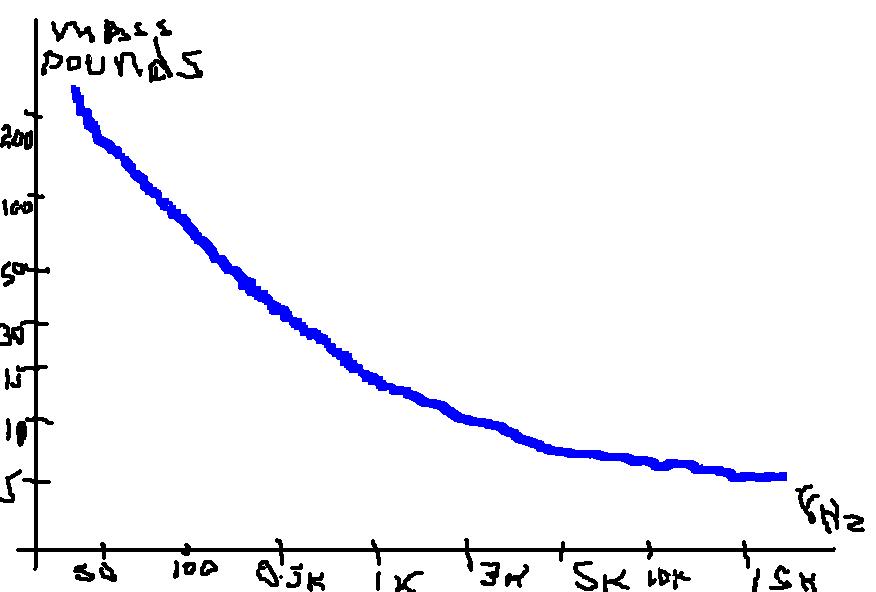
With distribution of mass, however, everything is much more complicated as the materials, the construction techniques, the specific design of the given horn, along with many other things become important. However, what is the more important that I've personally never built a big horn and the only credentials I might have to discuss the subject would be to express my hypothesis.
Definitely, a back chamber of a bass horn develops at tremendous pressure and it should be very solid, however how to propagate that structural solidness too mouth? Also, how to correlate that structural solidness with the actual Sound? Here is where we enter the mysterious world of the “Resonating Oops” - no one knows what is going on. I can share my very basic observations, which mostly are based on attitude and premonition then the optional experience. Consider them or disregard them - it is all up to you. However, those principles are the principles how I envisioned Macondo, how Macondo horns I asked to be made. So…
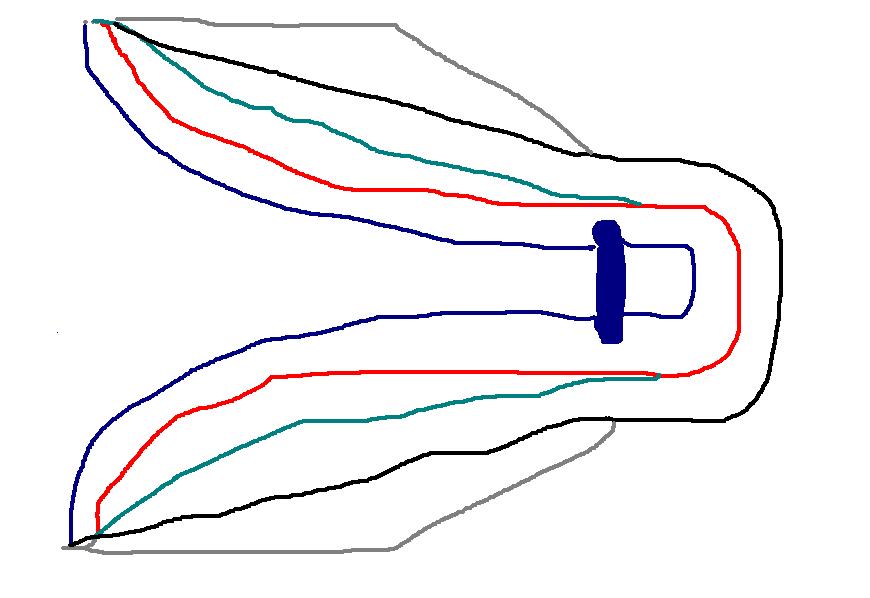
I will say that there are a few basic ways to propagate mass from throat to mouth: red, green, back and gray. Surely, the lower horn rate the more complicated to make the walls thicker and using stronger materials the walls might be made more and thinner. Still how it all correlates to sound? I have no idea? I use much more superior techniques to make the judgment about the thickness of the horn’s on different regions – I use a sense of visual balance and pure esthetic beauty.
Let to be honest – only God knows what the hell in happening inside of bass horn and how the walls of the horn vibrates under the influence of different frequencies, different materials, different approximation to boundaries and zillions of other reasons. Furthermore, if a horn has built and still demonstrates some colorations, then the reasoning for those colorations would be other zillions factors. How from a sound of built and installed horn to subtract the sounds walls’ thickness– I do not know, and I do not think anyone else knows. The people who work with materials could say a lot about vibrations but they hardly can correlate it with Sound. We can build a horn and then begin to load it with is a dampers or mass but no one said that completely damped walls of a bass horn shell sound necessary better in context of a given installation. Therefore, when I think about bass horn mass propagation I think in the same way how I thought about Macondo upper bass horn – it shall be visually properly balanced, guessably rational and… pretty. No other criteria are known to me.
There is one “kinky” solution for lower bass horn that come to mind mine doing my “Resonating Oops” research. Since to make 50Hz straight horn with thick-enough walls is too complicated I thought that if I go there I will make it Resonating-Oops-adjustable. The image below indicates the idea if I would not willng to go do 800 pounds construction
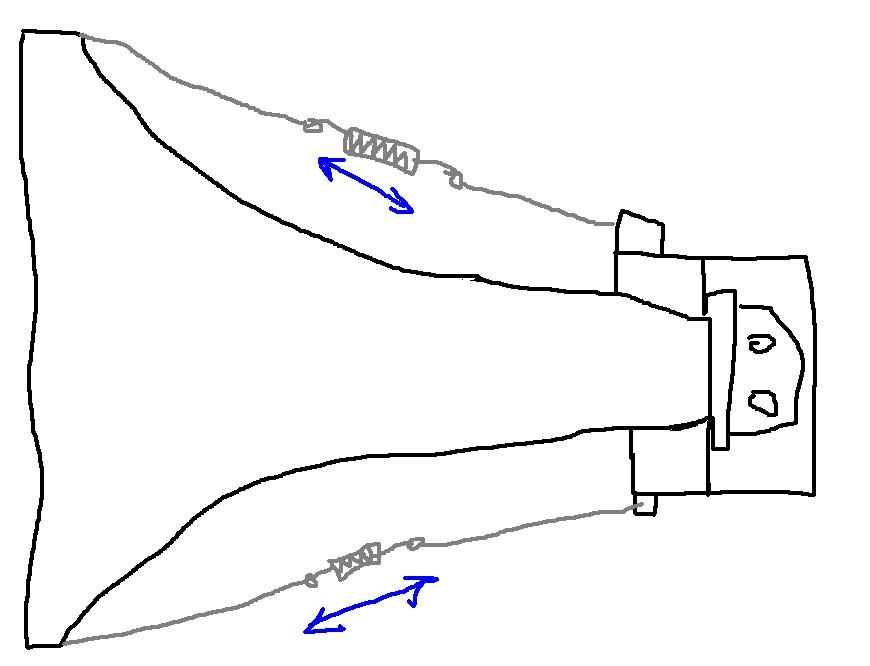
The Cat
|
|
|
|
Posted by stuck.wilson on
08-05-2007
|
Romy-
In this thread, you previously said--
12) If a
filter requires a phase inversion then it is preferable to flood
crossover point with amplitude and do not invert phase.
What exactly do you mean by this and how's it work?
thanks-
d.
|
|
|
|
Posted by Romy the Cat on
08-05-2007
|
 stuck.wilson wrote: stuck.wilson wrote: | | In this thread, you previously said--
12) If a filter requires a phase inversion then it is preferable to flood crossover point with amplitude and do not invert phase.
What exactly do you mean by this and how's it work? |
|
It is it not a widely used method and some, particularly academia-type people would consider it heresy. However, I do not think that there is such a thing as heresy it heresy delivers better result.
The crossovers of higher order (second) introduced 180 degree phase shift and it is a common practice to use opposite polarity of bottom and top channels. However, in some instances (not all time, and I never was able to successfully implement with tweeters) I came to observations that even use of polarity-inventing crossover but without physical reversing of polarity does serve positive results. Without reversing polarity and use of 180 degree phase shift we will have a suck out at crossover point. Nevertheless, in context of multichannel installation, where each driver works in a narrow range, it is possible to increase amplitude of one channel, and by means of it to flood-out the sucked-out at crossover porn. Interesting that this methodology still might have some residual none-linearity of response but there is something more important than linearity. If forget about linearity and to use imaging-centric crossover building techniques than in some cases the benefits of none-inversion are clearly auditable. In fact, I believe I have written on my sides about that before.
The method was not invented by me, it rather my common sense know-how that I recognize as part of normal design process. Initially it was implemented by Yamaha loudspeaker in the end off 70s, and its was were I took the inspiration from. Later own looking at others people’s “better” crossover designing techniques (that have little to do with what books suggest) and discovering my own channels integration techniques I recognized that no-inversion method should not be take out of consideration, and if it is employable then it should be utilized. Rgs, the Cat
|
|
|
|
Posted by Romy the Cat on
10-10-2007
|
|
I would like to mention a few things about the general tendencies of Macondo response. The tendencies are so predictable and so redundant with different vintages of Macondo that I accept them as axioms. I might add that those axioms of my mind work only for me and only in my room but I doubt that I would be correct if I add it.
So, of you see the Macondo’s response that is posted at “My Playback” page (3 years ago)
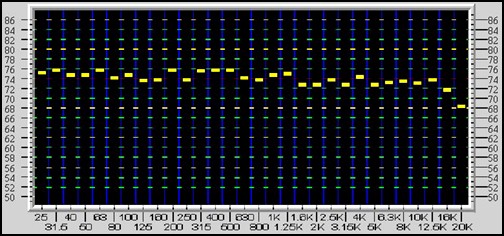
then you will see a tendency of the response having the bottom of the spectra 1-2db elevation over the top of the spectra (do not look at anything above 10K). That is very common for me and observing many acoustic system solutions I generally have tendency to prefer this way. I am not taking about lifting up bass but about VERY gradual and very gentile response as it depicted here
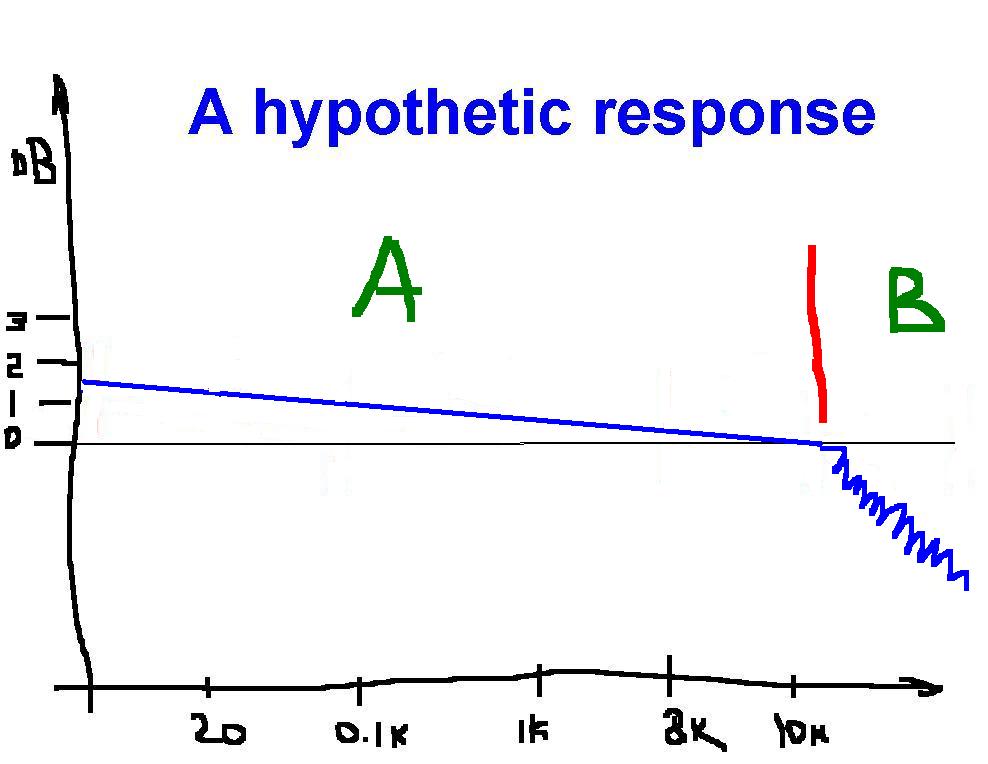
I would not even mention that the evenness of response should be accomplished by natural means” – people who read my site for a while or have own ears attached to brain knows what I mean.
The steepness of general LF elevation over HF is determined by reverberation time in a given listening room: a larger room requires less LF elevation. I presume that slightly hotness at LF positively compensate our discomfort related to shorting reverberation time in our listening environments and the fact that recordings were made with too up-closed microphone.
Another subject is the HF region above 9K-10K. There are no rules in there that might be described in there using methods of frequency response. Currently available frequency response analyses deal with static response but at HF the transient response is subjectively dominating force. There are not know to me methods to evaluate it by measurements and even if they exist then they would not take under consideration the rules of subjective satisfaction by phase randomization.
So, Macondo Response, or the response as I feel it “should be” is rather a subject of consciousness then the subject of mathematic approximations. Rgs, Romy the Cat
|
|
|
|
Posted by Paul S on
10-10-2007
|
I have long wondered why it seems that hi-fi systems always fail to deliver realistic "weight", certainly with orchestral music, no matter how they "measure". A "flat" chart is a virtual guarantee of sound that ultimately lacks "substance" in the lower-mids/upper bass, even if the frequency range that "covers" the area in question is elevated. Of course true LF is elusive in reproduction to the point where we thrill just to hear it, and here again the attempt to simply "lift" output does not translate to "realistic" LF. It seems like even when the frequency range is "present", as in the measuring sense, yet it lacks that bottomless "ferocity" that live music, even quiet music, possesses.
The discussion of "room gain" is an old one, for sure, and it is true that a rising LF can compensate for this "live" effect. But I also hear the unobtainable "weight" outdoors, where there is no "reverberation", per se, and the sound just "dies" immediately, or perhaps there are some subtle and/or "distant" cues like reverberation.
Any thoughts on where all this mysterious energy comes from, that we can get a "flat" chart but still not be able to recreate it?
Best regards,
Paul S
|
|
|
|
Posted by Romy the Cat on
10-10-2007
|
Paul,
you are missing the point. When I said about “tilted” response it is still a "flat response". If your 10kHz-2 octaves has minus 1-2dB over your 30Hz +2 octaves then it is VERY flat, way flatter than normal deviation of most playbacks out there. So, we do not talk about LF or HF in my case but rather about very smooth tilting the entire balance of an installation toward to the bottom. The very same take place in live music where air’s phase randomization act as a very effective low-pass filter. However “live” sound has also it's HF dynamic and transient characteristics order of magnitude more superior then playback… Still, it is very important to understand the mildness of the tilting that is KEY. If response feels as tilted then it was tilted too much anyhow... I also did not proposed to cure with the “response tilting” the harmonic deficiency of playback in the “Melody Range”.
The Cat
|
|
|
|
Posted by Paul S on
10-10-2007
|
Romy, I recognize and appreciate the very specific points you make but I am instead referring only to your last observation about "the harmonic deficiency of playback in the melody range", and I was just trying to shoehorn this idea into the discussion of the "flat-but-tilting" frequency response, or the "measurable frequency response", in general. I am not aware of any intelligent discussion of this specific issue, and in fact it seems like there is prevailing denial of this problem, especially by the high-dollar speaker manufacturers, who either point to flat charts or put on entertaining demonstrations either not noticing this problem or trying to hide it with other impressive "effects". In fact, it is just this obvious lack contrasted by overblown "performance" in other areas that puts me off the "high-end" speakers I have heard, as though they just got too big for their own britches while remaining too small at the same time, like the mouse that roared.
I can't help but wonder what is "there" to "flatten" the measured response but still not sound correct in terms of "weight" and "ferocity".
I think I have already said that I advocate at least a serious nod to "flat response"; in other words, I do not think it is a good idea to simply ignore this issue, at least at the conceptual/design level. Tilted flat is fione by me on a case-by-case basis, and my own systems seem to wind up pretty much like your chart, to the extent I could pull it off.
If this is the wrong thread for this discussion, please move it.
Best regards,
Paul S
|
|
|
|
Posted by Romy the Cat on
10-10-2007
|
Paul,
harmonic balance and frequency response are different things. We presume that if s playback has right (acoustic-like) harmonic balance them, only then, we can talk a bout sane frequency response. Do an experiment. Take your ML2 and load your speaker to 4R tap and 16R tap. Measure the delta of frequency response with a good high resolution analyzer. At non-critical power levels you would hardly see the deference in frequency response but you will hear the change of harmonics balance: more idle tube = less harmonics. So, I would not go into the subject of "response tilting" as a tool to cure harmonics –they are very different things…
The Cat
|
|
|
|
Posted by Romy the Cat on
03-06-2008
|
|
Believe me or not but since last spring when I undertook the single-amp conversion and went for the six-channel Super Melquiades my playback never sounded as I would like it to. It was better or worst but it was never how I meant. The last week the tide is turned now I am is very interring period.
The six-channel Melquiades is done, the new calibrated rubes are deployed into all 12 channels and the amp acts perfectly as it was expected. Macondo is bound to Milqs and behaves more or less OK. Now it is a very interesting time – to make the system to sound in a certain way. There is no technical impediments that I need to fight with - it is just Sound should be organized.
Ironically, to organize sound at this point is not necessary implies much listening but rather much thinking. I do listen what I am getting, and keep addressing small bugs but the most important I am fantasizing and am trying to experiment about the NEW possibilities the 12 channels of Melquiades-Macondo over now. The experiences that I getting now are truly amassing and the journey is stunningly fascinating. With 10 channels + injection the entire concept of linearity, positioning, and any other aspects are viewed slightly different.
I think I will be in this state for another month or so and then will try to attack the DPoLS… The Cat
|
|
|
|
Posted by Romy the Cat on
03-08-2008
|
|
Last week and this weekend I been spending some considerable amount of time and efforts to do what I intended to do for long time – to finalize the Macondo’s ideas. What I mean is that with all Melquiades progress, the fundamental channel, with Injection experiments only the last month I had everything in place that would allow doing smothering definitive and lasting.
So, my intention was is to tune the Macondo right (that imply the Melquiades and the Macondo-Melquiades interaction as well) the and then go for a new MUCH more precise level of Macondo time alignment. I have found new superbly interesting configurations for Macondo and very cool scenarios for time alignment. Now I am implementing them but at very high precision of timing 1/12dB and higher if I can. The results are very favorable.
The Cat
|
|
|
|
Posted by Romy the Cat on
03-09-2008
|
|
Well, what can I say, there is no surprise but the more and more I went into anal-retentiveness of time-aliment the more interesting result I got. Unfortunately with my the frame of my Macondo I was not able to go at the 1/12dB precision, I was able to go there but I have difficulty to set an to maintain my channels at this level of precision. So the collusion for the followers: think about methods of fixing and advancing the channel’s location before you do the frame.
In my situation Macondo was not something I designed from scratch (that would be fan with my currant knowledge!!!) but rather an evolutionary acoustic system, so I have to use what I have. Therefore, I decided to hard-fix channels, leaving min opportunity for adjustability. Of course the geometrical alignment did not work and I was trying to find some kind of “in-frame algorithm” to monitor the alignment run-off. Trying a few scenarios I hard-fix the tweeter, injection, fundamentals and both bass channels. The MF still have some freedom but I have means to locate it very accurately with a system of pre-calibrated marks. I would love to have MF sitting on machinist's precise single-axis fine-positioning table. In fact if I did it from scratch I would incorporate the positioning table into Mocondo. I think with positioning table I would be able to go to 1/12dB of even to 1/24dB precision.
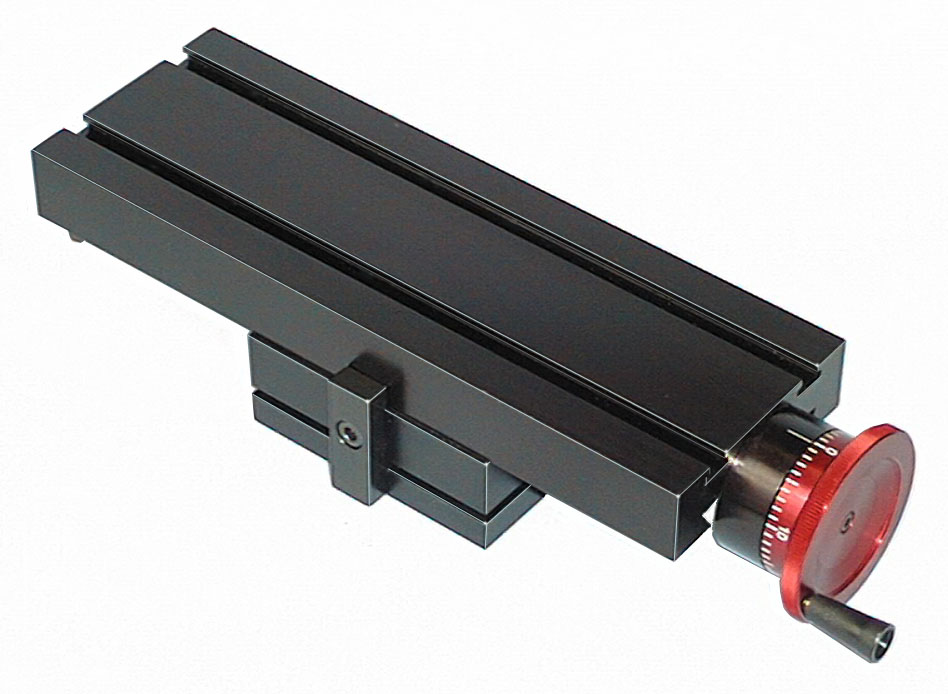
This level of resolution is necessary only for MF and tweeter but I do not know is it is necessary in my case as the length of my water drop it is already too compromised for the very short radios of my extreme near-filed.
Anyhow, here is one addition to Macondo's Axioms: think about the opinions of fine-positioning of your channels BEFORE you start to do anything. The higher precision the better result, the more extreme you do into near-field the more precision of time aliment you need to execute.
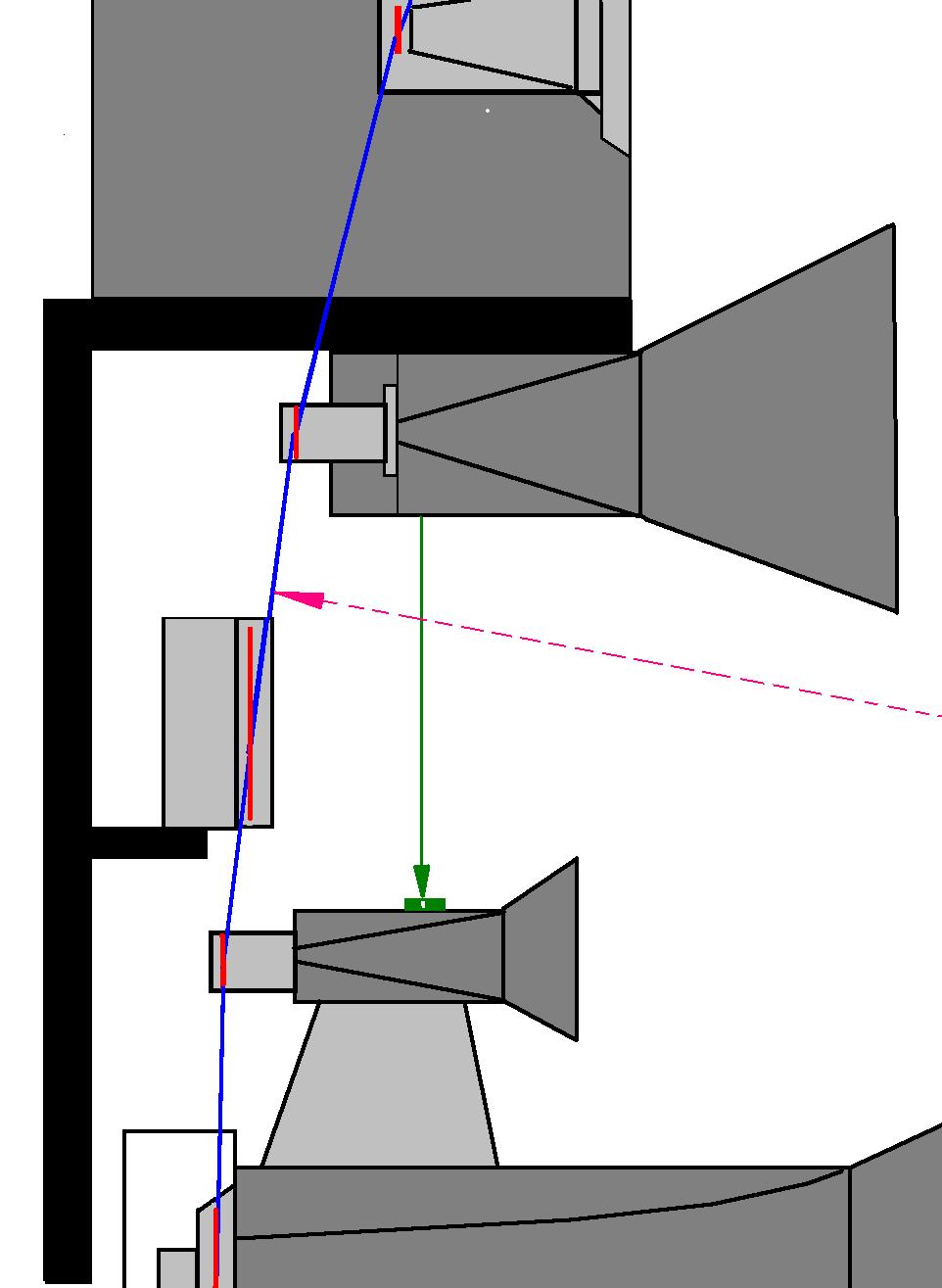
The Cat
|
|
|
|
Posted by Romy the Cat on
03-09-2008
|
I was playing more with precision of my MF channel and I became convinced that I should not do it anymore and I should get better interfaces between the frame and the MF horn. So, I have decided to get a positioning table. I have absolutely no knowledge in the fields of machinery equipment. If someone know a source for one-two axis, 8”-12” long and 3-4” wide, sexy looking, not overly expensive positioning table with .001 precision then let me know. I will build an arm off the Macondo’s frame to hold the positioning table and will put my MF horn on it. The table on the picture above is very good but it is $180 each. It will be my way out if I do not found anything beter.
The Cat
|
|
|
|
Posted by jessie.dazzle on
03-10-2008
|
|
Romy wrote :
"...The table on the picture above is very good but it is $180 each. It will be my way out if I do not found anything beter..."
Romy,
$180 does not seem expensive for such a table; for that price it is likely to have been "Made in China", which is probably perfectly fine for the intended application.
Most of these tables have a built-in pre-load adjustment which allows compensation for "wear" (which really means lack of precision) in the mechanism... If so equipped, you should be able to remove all play from the adjustment mechanism, meaning that even the slightest rotation of the adjuster wheel will result in movement of the table. (If you decide to go for it, make sure the table position can be locked, and don't forget that you will need the "T-bolts" to interface with the slots in the table).
Since in the case of the MF horn + driver we are only talking about a max of about 25 lbs load, in terms of robustness, this table is sort of over-kill... Not a problem, but there is certainly a less heavy-duty, yet precise and possibly less expensive option ; something along the lines of the positioning mechanism for a photo enlarger...
You might look into a "ball screw driven carriage"
Something like this :
http://www.jena-tec.co.uk/linear-actuators.php
Scroll down to the manual adjusters
Or this :
http://motionsolutions.com/Catalogs.htm
See the LC 46 Actuator
Or this :
http://news.thomasnet.com/fullstory/494204
The above stuff will likely not be cheap.
It is also possible to make your own zero-play adjuster using parts of more humble origin... Having said all that, I think I would just pay for the over-kill ready to go solution; it should make fine tuning the time-alignment a real pleasure.
My own adjustable frames are nearly done (see the jessie dazzle project thread)
http://www.goodsoundclub.com/Forums/ShowPost.aspx?postID=4941#4941
In my case the position of the horns is infinitely variable within the range of each pair of sliding rails. I had thought of incorporating a precision adjuster of my own design, but for the moment have elected against such a luxury, reasoning (perhaps incorrectly) that I have the patients to get it right without, especially since it is not something I am likely to change every day. In any case, this sort of addition would be simple to incorporate later.
I will be following your progress should you decide to go ahead with this addition.
jd*
|
|
|
|
Posted by Romy the Cat on
03-10-2008
|
|
Yes, Jessie, thanks for the idea.
I was looking over all of them and currently set my eyes on the Sherlin single single-axis 8" manual slide:
http://www.sherlineipd.com/manslide.htm
It should be Om and it is in black. I would need to attach a horn harness atop and the amps to the frame at the bottom. You will be very surprised how much effect the precision makes subjectively for MF/HF integration. Do not forget that 12.5K of crossover we have less then 3mm wavelength…. I do not feel that other channels would need such a precision and I would need juts one sliding table with micrometer attached.
What is also is very interesting to resolve is how to set the horns axis’ strictly parallel. Now I use my Cat’s laser pointers but it would be more accurate way to do it….. The horizontal parallel is easy to set by air bubble. The excursion can be done by a calibrated slide and sound analyzer. How about the parallel-ness of the axis? The Cat
|
|
|
|
|
|
|
Posted by Romy the Cat on
03-10-2008
|
|
Thanks, el`Ol
What I wonderful devise to position a tweeter on it! It has even perfect size for my Water Drop! It will not help in my case as my tweeter is firmly makes and my MF channel is flimsy but for somebody why would need a perfect tweeter alignment platform is I God sent. el`Ol, buy a 100 of them for $19.95, put an idiotic label on them - something like “Archimedes audio”, let me write up an article about the importance of super precise tweeters alignment and at next Danvers audio show this thing will be flying from your hands for $399. We can even advertise that this devise could measure 1/90000000000th of the light year distance or the fatness of 900000000 molecules of 99.9% silver. The Cat
|
|
|
|
Posted by jessie.dazzle on
03-10-2008
|
Romy wrote :
"...How about the parallel-ness of the axis?..."
Simple : All your horns were turned on a lathe... This means that if you place a straight beam across the mouth of each horn, in each case the beam will be perpendicular to that horns firing axis. So to be sure all firing axes are parallel, with horns mounted in the frames, verify that all mouth faces measure dead vertical (use a sprit level and a 90° angled block against the vertically positioned beam over the mouth of each horn).
jd*
|
|
|
|
Posted by el`Ol on
03-10-2008
|
 Romy the Cat wrote: Romy the Cat wrote: | |
let me write up an article about the importance of super precise tweeters alignment and at next Danvers audio show this thing will be flying from your hands for $399.
|
|
http://www.ascendo.de
|
|
|
|
Posted by Romy the Cat on
03-10-2008
|
|
el`Ol, I have written about Ascendo System’s approach somewhere but what Ascendo does and what I say are different. I always stressed the anal retentive time aliment but I never stressed the level of precision that I am stressing it now. You might make your own experiment and confirm that going from 1dB precision to 1/12dB precision is auditable, if to know what to pay attention while we are listen.
It is not to mention that Ascendo and Macondo are at totally different realms of time aliment. I would even say that in case of Ascendo the adjustable head is not really necessary as the precision that they need might be accomplished by a good baffle design. Ascendo HF section is crossed at 3.2kHz. At 3.2kHz the length of the wave is 10.6cm with 1 degree of misalignment equal 0.9mm. Macondo is crossed at 12.5kHz, that makes wave length 2.7cm with 1 degree of misalignment equal 0.075mm… Rgs, Romy
|
|
|
|
|
|
|
Posted by Romy the Cat on
03-21-2008
|
 Romy the Cat wrote: Romy the Cat wrote: | | I was playing more with precision of my MF channel and I became convinced that I should not do it anymore and I should get better interfaces between the frame and the MF horn. So, I have decided to get a positioning table. I have absolutely no knowledge in the fields of machinery equipment. If someone know a source for one-two axis, 8”-12” long and 3-4” wide, sexy looking, not overly expensive positioning table with .001 precision then let me know. I will build an arm off the Macondo’s frame to hold the positioning table and will put my MF horn on it. The table on the picture above is very good but it is $180 each. It will be my way out if I do not found anything better. |
|
Ok, I am getting somewhere with precise positioning of my MF channel. The .001mm slide-tables are hard-bolted and aligned on the MF horns and the 11” arm from the Macondo frame to the bottom of the slide-table is orders and will be done in a couple days.
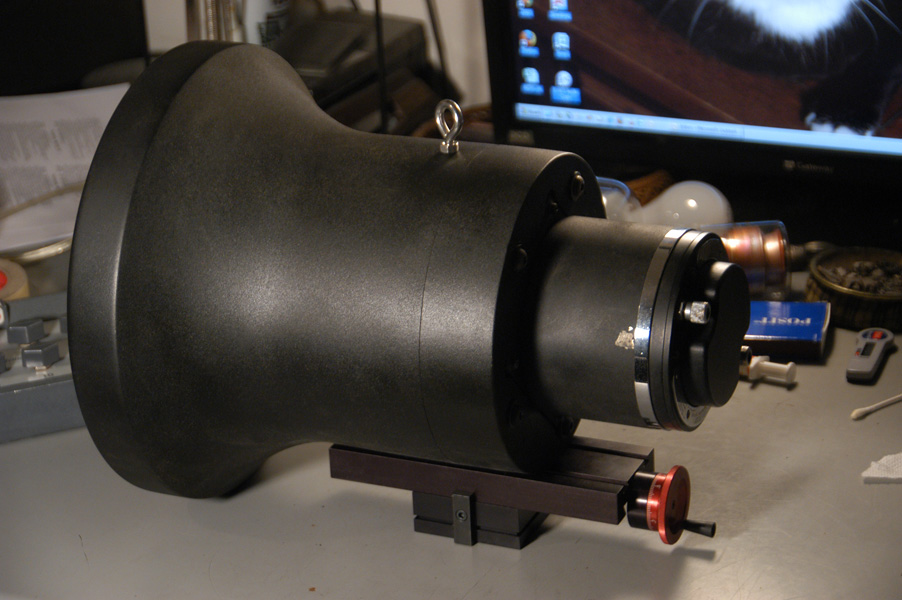
|
|
|
|
Posted by Romy the Cat on
04-01-2008
|
|
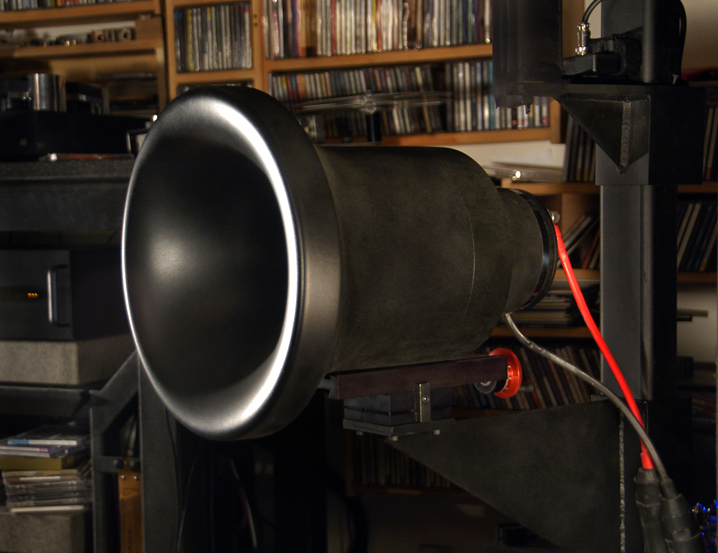
|
|